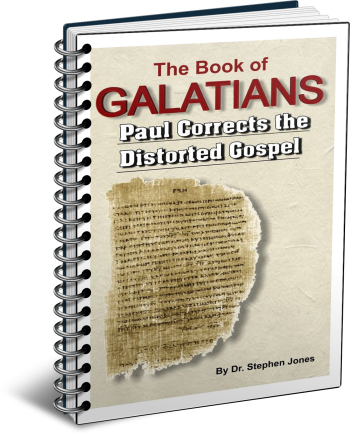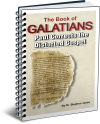Latest Posts
View the latest posts in an easy-to-read list format, with filtering options.

This is a verse-by-verse commentary on Paul's epistle to the Galatians, which was written to combat those Jewish Christians who were unable to leave the Old Covenant and adhere to the New Covenant. In their attempt to add the New Covenant to the Old, and to add Jesus to the temple system of animal sacrifices and other rituals, they had distorted the gospel.
Category - Bible Commentaries

Galatians 2:19 is one of the most misunderstood verses in the Bible.
19 For through the Law, I died to the Law, that I might live to God.
When Paul says, “I am dead to the Law,” many invert it to say, “The Law is dead.” The fact is, it was Paul who died, not the Law. Rather, it was the old Saul who died and was raised again in newness of life with a new name, Paul.
When we take into consideration the purpose of Paul's statement, we see that he was talking about the Judaizers and their belief that the Law was a necessary component of justification or salvation.
Paul had at one time held this view himself, back in the days when he was a zealous temple agent and extreme law-enforcer named Saul. But the old Saul had died on the Damascus Road. When Paul re-emerged as a Christian missionary, he forsook his old identity as Saul and was raised to newness of life as Paul.
Saul was his Old Covenant name; Paul was his New Covenant name. He changed his name in order to make it clear that he was not the same man any more. So we should read Gal. 2:19 to mean: “Saul, the old man, is dead to the Law as a means of justification, that I might live unto God.”
How did his “old man” die? It was the Law that killed Saul. Hence, he says, “for I (Saul) through the Law am dead to the Law.” This idea is explained more fully in Romans 6:6-8,
6 Knowing this, that our old self [Saul] was crucified with Him, that our body of sin might be done away with, that we should no longer be slaves to sin; 7 for he who has died is freed [justified] from sin. 8 Now if we have died with Christ, we believe that we shall also live with Him.
This passage comes in the context of Paul’s earlier question in verse 1: Shall we sin that grace may abound? Paul says that our old self, which was a slave to sin, has died, being crucified with Christ. He then speaks of being raised with Christ (as symbolized by baptism). Our new “self” is no longer a slave to sin, but is justified from sin.
Justification comes by death alone. The old self has to die, for it was condemned to death because of Adam’s sin (Gen. 3:3, 19). Only the new man will live. Saul had died, so that Paul might live a life that was no longer a slave to sin.
The purpose of this new life was not meant to give us a free pass to sin at will. Sin is lawlessness, John says in 1 John 3:4. The divine plan was to set us free from sin, not righteousness. But yet Gal. 2:19 has been taken as a license to violate the divine Law, as if God had repealed His standard of righteousness and now allowed believers to do what was right in their own eyes.
While it is certainly true that the Law’s penalty for our sin has been paid, if we continue in sin, are we not heaping more pain on Jesus as He died on the cross? Our calling is to be like Christ, not to live like the devil.
Since the old self cannot help but sin, since it is carnal, while the new self is “Christ in you” and is a “holy seed” that cannot sin (1 John 3:9), it is evident that those who live like the devil have not yet died with Christ. Such people are still identified with their carnal selves, rather than being part of the body of Christ.
The Law can only judge Law-breakers, for that is its function. Saul was a Law-breaker without realizing it until his Damascus Road revelation of Christ. And so he allowed his old Adamic man to die at the hands of the Law.
In other words, Paul allowed the Law to do its God-given job. The purpose of the Law is to execute the old man, in order that the new man might arise in Christ. Verse 20 explains this further, of course, where he says, “I am crucified with Christ.” Take note that Paul did NOT say, “The Law was crucified with Christ.”
Even in the present time, whenever someone today is “crucified with Christ,” he or she is giving assent that the Law has not been put away, for how else is the old man crucified, except by the hands of the Law? If the Law were put away at the cross, there would no longer be a Law to crucify our old man. And how, then, would Saul himself have been crucified months after Jesus was crucified?
20 I have been crucified with Christ; and it is no longer I who live, but Christ lives in me; and the life which I now live in the flesh I live by faith in the Son of God, who loved me, and delivered Himself up for me.
This entire passage is about the death of Christ and our old man. It is not about the death of the Law. So Paul's statement in verses 19 and 20 is an essential part of the flow of his argument against the Judaizers.
Paul was saying, in essence, “Look, I used to be a Judaizer, too. I used to think that if I could be zealous enough for keeping the law, I would be justified before God. I used to think that my old Adamic man could be trained to perfection, if I just tried hard enough. But all it did was cause me to consent to murder (Stephen in Acts 8:1).” Paul then says in verse 21,
21 I do not frustrate the grace of God; for if righteousness come by the Law, then Christ is dead in vain.
Frustrating the grace of God would be to raise up Saul once again, so that the life that he lives would not be Christ living in him, but the first Adam raised from the dead. No, righteousness does not come by the Law, for then would the Old Covenant be re-established in Paul. There is, instead, a New Covenant method of attaining righteousness. It is the righteousness of Christ imputed to the believer by faith, so that when the law looks at us, it sees only Christ and His righteousness, for we are in Him and He in us.
We must ever keep in mind the basic flow of Paul's letter, along with its purpose. He argues against the Judaizers and against their MISUSE of the Law, not against the Law itself. As for the Law itself, Paul has nothing but praise. “By the Law is the knowledge of sin” (Rom. 3:20). “Do we then make void the Law through faith? God forbid; yea, we establish the law” (Rom. 3:31). “Wherefore, the Law is holy, and the commandment holy, and just, and good” (Rom. 7:12). “For we know that the Law is spiritual, but I am carnal” (Rom. 7:14).
The problem is not the Law. The problem is me and my carnality. My carnal (Adamic) man can never attain righteousness by zealous attempts to be perfect. It will never be reformed. It can only die according to the sentence of death imposed upon Adam in Gen. 3:3. Only the new man in Christ can live, and it is raised from the dead, not by the Old Covenant, but by the provisions of the New Covenant.
This is the essence of Paul's message in the book of Galatian s. It is not the anti-Law epistle, but one which unseats the Law as a means of justification, given our inability to keep it. Its true purpose is to expose sin wherever it lurks. It teaches us what sin is, so that we may refrain from doing those things which are not pleasing to God. Refraining from sin does not justify us, but it does give us a measuring rod showing us how conformed we are to the mind of Christ.
Our old man will never be perfected, because even if it were willing, “how to perform that which is good, I find not” (Rom. 7:18). It can only die. And the new man is already perfect and is incapable of sin, for it always “delights in the law of God” (Rom. 7:22).
In practice, there is a continual war going on in us between these two “men,” that is, the two Adams (Rom. 7:23). The old man serves the law of sin; the new man serves the law of God (Rom. 7:25).
Paul has two “I's” in Romans 7. There is the Saul “I” and the Paul “I.” These represent the son of the first Adam and the son of the Last Adam. Each strives to assert itself. The Judaistic “I” is Saul, but the “I” of Paul was in Christ.
I find it telling that much of Messianic Christianity and/or Christian Zionism has reverted to calling Paul by his old-man name, Saul. I doubt that many of them realize what they are doing, but it is a spiritual attempt to resurrect Saul and kill Paul. It is part of the attempt to remake Christianity into a sect of Judaism and to put the old Adam back upon the throne.
Paul never refers to himself as Saul after Acts 13:9, except when giving testimony about his past life as Saul. Modern Christians and Jews have no right to retain his old identity after Paul had deliberately changed his name to reflect his new identity in Christ. Paul was the great enemy of the Judaizers, but in recent years their tactic has changed. Now they (temporarily) have adopted Paul as one of their own to remake him as a Jew in their image.
If they were to succeed in resurrecting Saul, they would eventually discard all of his writings as uninspired, because they do not conform to the image of Saul. The long-term goal of the “false brethren” sent to spy out our liberties is to create a distorted gospel. They intend to continue distorting it until it is so meaningless that they can discredit the entire New Testament as nothing more than a temporary malfunction of the true Old Covenant religion.
Modern Christianity has largely fallen into this trap by teaching that Judaism will be re-established in the Age to come. They have planted the doctrinal seeds which, if they were to bear fruit, would make the New Covenant a temporary means of justification between temples in an “Age of Grace.”